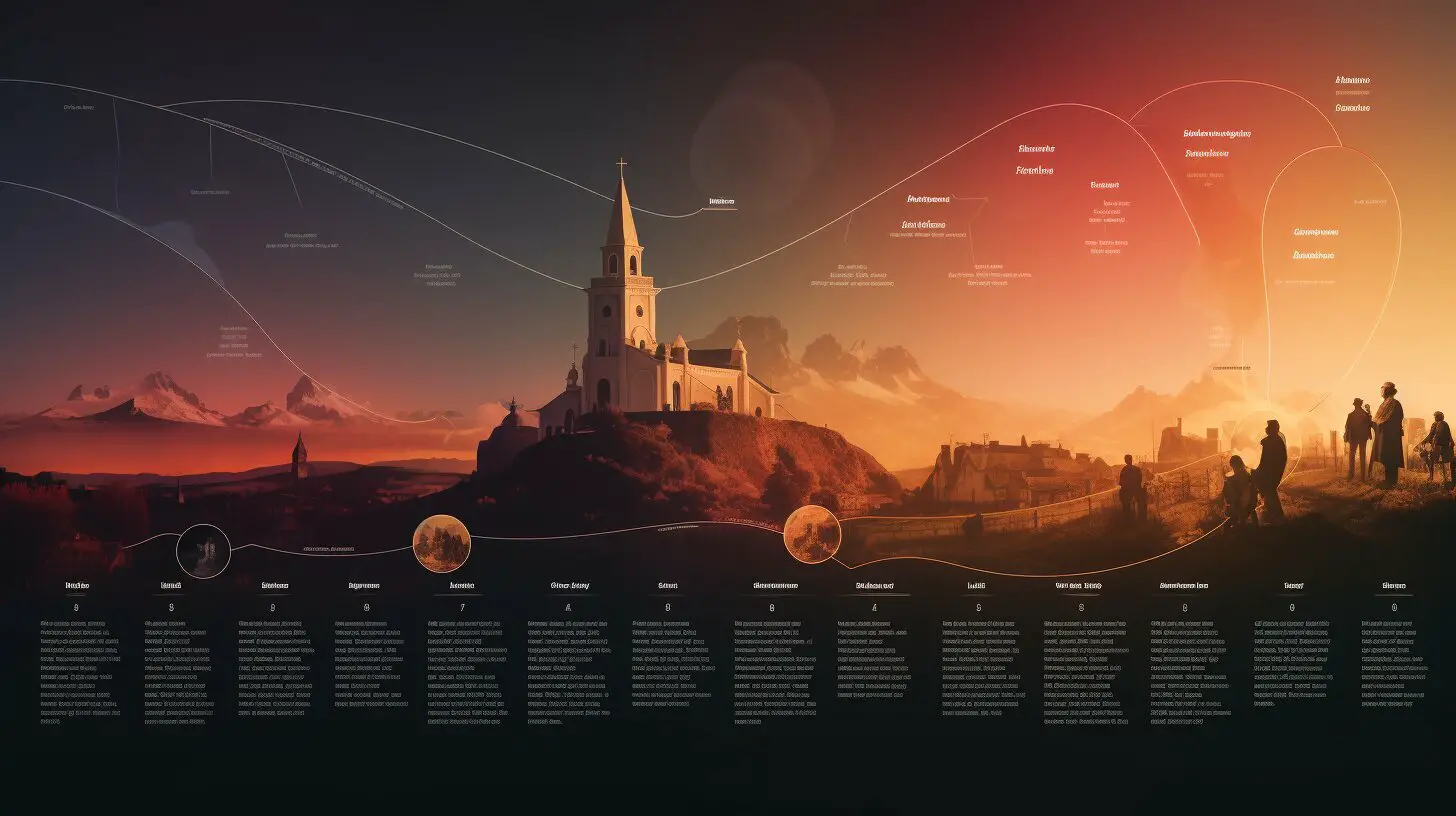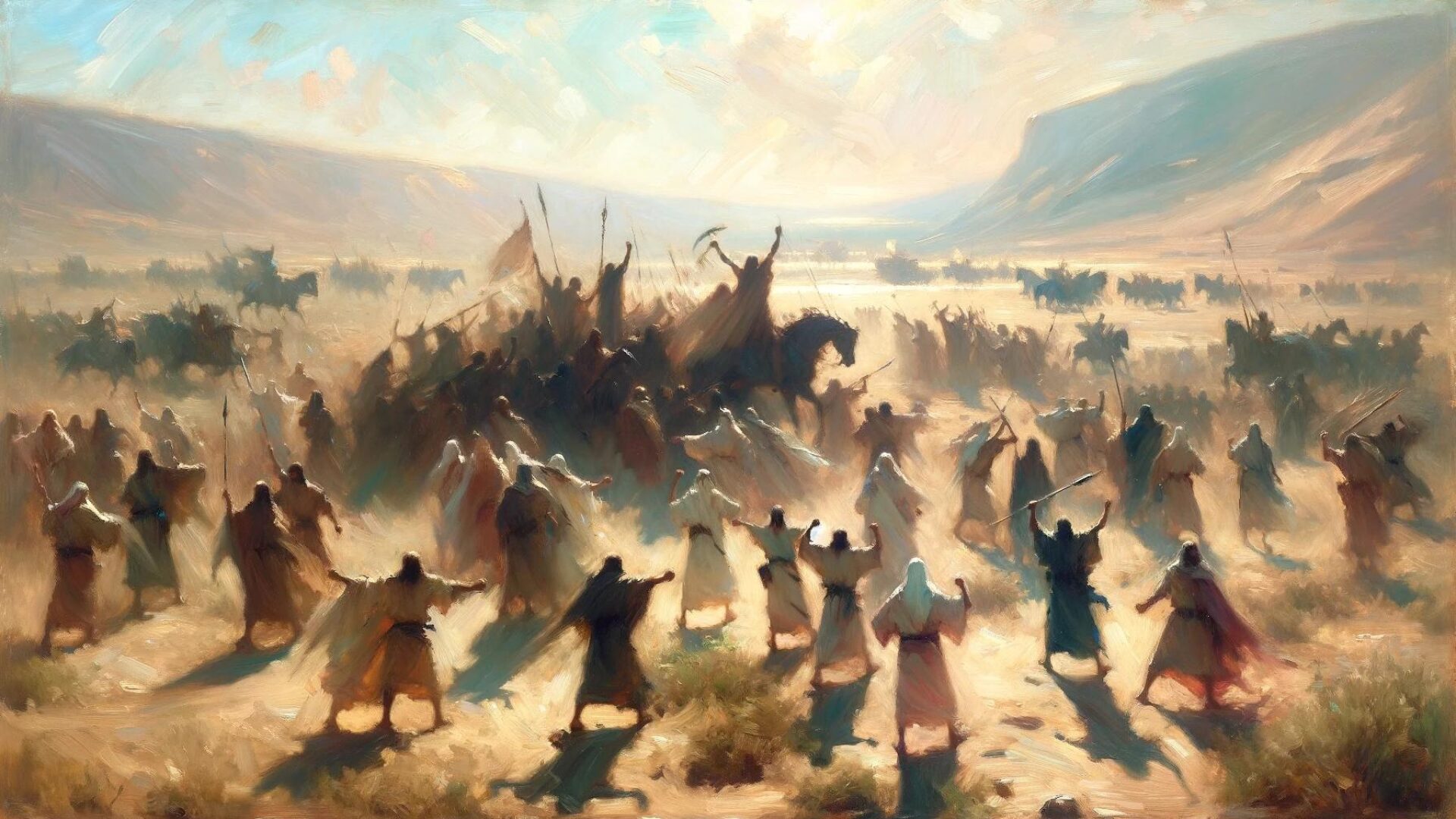Christianity is one of the largest religions in the world, with over two billion followers. Its history spans over two thousand years, and understanding its evolution is crucial in comprehending the religion today. In this article, we’ll take a look at the major events, influential figures, and key movements that have shaped Christian Church history.
Early Christianity: Origins and Growth
Christianity originated in the eastern Mediterranean region in the early 1st century A.D. Jesus Christ, born in Bethlehem in Judea, began preaching and teaching in Galilee and Jerusalem. He attracted many followers, who believed he was the Messiah, the savior prophesied in the Hebrew Bible.
Jesus’ teachings emphasized love, compassion, and forgiveness, and he drew from Jewish traditions and scripture. He performed miracles, such as healing the sick and feeding the hungry, which further increased his popularity.
After three years of preaching, Jesus was arrested, tried, and sentenced to death by crucifixion. He was buried in a tomb but, after three days, his followers discovered the tomb empty, and they believed that he had risen from the dead.
Following Jesus’ death and resurrection, his disciples continued to spread his teachings. The apostle Paul, in particular, played a significant role in the growth of Christianity. He traveled extensively, establishing churches and spreading the message of Jesus Christ throughout the Roman Empire.
Christianity faced persecution from the Roman authorities, who saw it as a threat to their power. However, it continued to grow. In the 4th century A.D., Emperor Constantine converted to Christianity and made it the official religion of the Roman Empire. This led to the construction of large, ornate churches and the adoption of Christianity by many in the empire.
Early Christian Communities
Early Christian communities formed in various regions of the Roman Empire, including Greece, Egypt, Syria, and Rome itself. They faced persecution and had to worship in secret, using symbols such as the fish and the cross to identify themselves to other Christians.
The early Christian Church had no single leader or hierarchy, but rather local communities were led by bishops, who were responsible for the spiritual well-being of their congregations. These bishops were seen as successors to the apostles, and they had the authority to make decisions on matters of faith and practice.
Over time, the Church became more organized, and a hierarchy of bishops emerged. The bishop of Rome, known as the pope, became increasingly powerful and was seen as the leader of the Christian Church. This led to tensions with other bishops, particularly in the Eastern Church, which eventually led to a schism between the Roman Catholic Church and the Eastern Orthodox Church in 1054 A.D.
Despite these divisions, Christianity continued to grow and spread throughout the world, becoming one of the world’s major religions. Its origins in the teachings of Jesus Christ and the early Christian communities have had a lasting impact on Western civilization and culture.
The Development of Christian Denominations
Throughout Christian Church history, different denominations have emerged, each with its unique theological beliefs, practices, and structures. The division of Christianity into various denominations began in the early days of the Church and has continued to evolve over the centuries.
The Catholic Church is the oldest and largest denomination, tracing its roots to the early Church and the teachings of the apostles. Eastern Orthodoxy emerged as a separate branch of Christianity in the Byzantine Empire, with its distinctive liturgical practices and theological beliefs.
| Denomination | Beliefs |
|---|---|
| Lutheranism | Salvation through faith alone, not good works |
| Anglicanism | Importance of scripture, tradition, and reason in understanding God |
| Methodism | Emphasis on personal piety and social justice |
| Pentecostalism | Belief in the gifts of the Holy Spirit, including speaking in tongues |
The Protestant Reformation, which began in the 16th century, led to the formation of many new Protestant denominations, challenging the authority of the Catholic Church. Protestantism encompasses a wide range of beliefs and practices, from the evangelicalism of the Southern Baptist Convention to the liberal theology of the United Church of Christ.
Theological Differences
Theology is a significant factor in the development of Christian denominations. For example, Protestantism emphasizes the importance of individual interpretation of scripture, while Catholicism stresses the authority of the Church hierarchy. Eastern Orthodoxy places great emphasis on the mystery of the sacraments, while Baptists reject infant baptism and emphasize adult believers’ baptism.
“What unites us is far greater than what divides us” – John Paul II
Despite these differences, Christians of all denominations share the belief in the death and resurrection of Jesus Christ and the hope of eternal life with God. While the divisions in Christianity have led to theological and cultural differences, they also represent the diversity and richness of Christian faith and practice.
Key Events in Church History
Christian Church history is filled with significant events that have shaped the religion into what it is today. From the Council of Nicaea to the Protestant Reformation, these events have had a lasting impact on Christianity.
| Event | Date | Description |
|---|---|---|
| The Council of Nicaea | 325 AD | This Council, convened by Emperor Constantine, resolved a major theological dispute by establishing the doctrine of the Holy Trinity. |
| The Great Schism | 1054 AD | This event marked the split between the Eastern Orthodox Church and the Roman Catholic Church, largely due to political and theological differences. |
| The Protestant Reformation | 1517 AD | Started by Martin Luther, this movement challenged the authority of the Catholic Church and led to the emergence of different Protestant denominations. |
| The Establishment of the Papacy | 6th century AD | The papacy, or the office of the Pope, became established as the highest office in the Catholic Church, with the Pope serving as the spiritual leader of all Christians. |
These key events, among others, have shaped the course of Christian Church history and continue to influence Christianity to this day.
The Influence of Church Fathers
The early centuries of Christian Church history produced a number of influential figures, known as the Church Fathers. These were theologians, bishops, and other leaders who played a major role in shaping the early Christian doctrine and guiding the development of the Church. The teachings and writings of the Church Fathers had a profound impact on the direction of Christian thought and belief.
One notable Church Father was Augustine of Hippo. Augustine lived in North Africa in the late 4th century and early 5th century, and is considered one of the most important figures in Christian theology. His writings, such as “Confessions” and “City of God,” explored the nature of sin, grace, and the relationship between the individual and God. He also articulated the concepts of original sin and predestination, which had a lasting impact on Christian thought.
Another influential Church Father was Thomas Aquinas. Aquinas lived in Italy in the 13th century and is known for his major contributions to the field of philosophy, as well as his work in theology. His most famous writing is “Summa Theologica,” a comprehensive exploration of Christian doctrine and philosophy. Aquinas emphasized the importance of reason and logic in understanding faith, and his ideas continue to influence Christian thought today.
“If you believe what you like in the Gospel, and reject what you don’t like, it is not the Gospel you believe, but yourself.” – Augustine of Hippo
The teachings of the Church Fathers were crucial in the development of Christian doctrine and theology in the early centuries of the Church. Their work helped shape the understanding of the nature of God, the role of Jesus Christ, and the relationship between the individual and the divine. Although their writings were produced many centuries ago, the legacy of the Church Fathers continues to be felt in Christianity today.
Christianity in the United States
Christianity in the United States has a rich and varied history that spans over four centuries. As the country developed and grew, so did its religious landscape. The arrival of the Pilgrims in 1620 marked the beginning of Christianity in the United States, and since then, the religion has played an integral role in shaping American society.
One of the most significant movements in American Christian history was the Great Awakening, a series of religious revivals that swept through the colonies in the 18th century. Led by preachers such as Jonathan Edwards and George Whitefield, the movement emphasized personal piety and a direct relationship with God, laying the foundation for many of the evangelical movements that followed.
During the 19th century, the United States saw a surge in the number of denominations and movements within Christianity. The Second Great Awakening brought about the rise of camp meetings, which helped to spread the message of revivalism across the country. It was during this time that the Church of Jesus Christ of Latter-day Saints (Mormonism) was founded in New York.
| Major American Christian Denominations | Founding Date |
|---|---|
| Catholicism | 1634 |
| Methodism | 1738 |
| Baptist | 1740 |
| Lutheran | 1748 |
| Presbyterian | 1789 |
| Adventist | 1860s |
In the 20th century, Evangelicalism emerged as a significant movement within American Christianity. It emphasized the importance of personal conversion, evangelism, and adherence to biblical teachings. Figures such as Billy Graham and Jerry Falwell played influential roles in the spread of Evangelicalism across the country.
Today, Christianity continues to play a prominent role in American society. The United States has the largest Christian population in the world, and the religion has been a driving force behind many social and political movements throughout the country’s history.
Influential Figures in American Church History
American Christian history has been shaped by numerous influential figures who dedicated their lives to spreading the gospel, fighting for equal rights, or providing aid to the needy.
Billy Graham was one of the most prominent evangelists of the 20th century, known for his passionate preaching style and his ability to reach people from all walks of life. He hosted numerous crusades and radio programs, reaching millions with his message of salvation.
Martin Luther King Jr. was a Baptist minister who fought for civil rights and equality for African Americans during the 1950s and 1960s. He used his platform to advocate for nonviolent protest, inspiring others to fight for justice and equality.
“Darkness cannot drive out darkness; only light can do that. Hate cannot drive out hate; only love can do that.”
Dorothy Day was a devout Catholic who founded the Catholic Worker Movement, a community dedicated to serving the poor and advocating for social justice. She lived a life of voluntary poverty, using her writing and activism to promote peace and human rights.
These influential figures, among numerous others, have left a lasting impact on American Christian Church history, shaping the way many Christians view their faith and the world around them.
Conclusion
In conclusion, understanding Christian Church history is crucial for comprehending the evolution and growth of Christianity. From its early origins grounded in Judaism and the life of Jesus Christ, to the development of different denominations, such as Catholicism, Orthodox Christianity, and Protestantism, church history has played a significant role in shaping the beliefs and practices of Christians worldwide.
Significant events like the Council of Nicaea, the Protestant Reformation, and the establishment of the papacy have had a lasting impact on Christianity, and the contributions of influential Church Fathers have helped to shape early Christian doctrine. In the United States, the history of Christianity is marked by the arrival of the Pilgrims, the Great Awakening, and the rise of Evangelicalism.
Key figures such as Billy Graham, Martin Luther King Jr., and Dorothy Day have contributed to the growth and development of Christianity in the United States, leaving a lasting impact on the faith. In short, Christian Church history provides us with a deeper understanding of the origins and evolution of Christianity, helping us appreciate the beliefs and practices of Christians around the world.
FAQ
Q: Why is understanding Christian Church history important?
A: Understanding Christian Church history is important because it helps us to comprehend the roots and development of Christianity. It provides insight into the beliefs, practices, and traditions that have shaped the faith over time.
Q: What are the origins of Christianity?
A: Christianity originated from the teachings and life of Jesus Christ, who is considered the central figure in Christian belief. It has its roots in Judaism, with Jesus being born and raised as a Jew.
Q: How did Christianity spread during its early years?
A: Christianity spread during its early years primarily through the efforts of Jesus’ disciples and early Christian communities. It gained traction in the Roman Empire and eventually became the official religion of the empire.
Q: What are the main Christian denominations?
A: The main Christian denominations include Catholicism, Orthodox Christianity, and Protestantism. Each denomination has its own distinct beliefs, practices, and organizational structures.
Q: What are some key events in Christian Church history?
A: Some key events in Christian Church history include the Council of Nicaea, which established important doctrines, the Protestant Reformation led by Martin Luther, and the establishment of the papacy.
Q: What is the history of Christianity in the United States?
A: The history of Christianity in the United States is characterized by the arrival of the Pilgrims, the Great Awakening, and the rise of Evangelicalism. It encompasses various denominations and movements that have shaped American Christianity.
Q: Who are some influential figures in American Church history?
A: Some influential figures in American Church history include Billy Graham, Martin Luther King Jr., and Dorothy Day. They have made significant contributions to the growth and development of Christianity in the United States.





